Marty Nemko's Blog, page 420
February 10, 2014
David's Saga: A continuing series on work today and related topics. Episode 14: The Marriage
 In the previous episode, David and Susan settled into life in Sage River, doing their jobs remotely. Less stressed, they were able to work on their parenting skills.
In the previous episode, David and Susan settled into life in Sage River, doing their jobs remotely. Less stressed, they were able to work on their parenting skills.Next, they turned to their marriage. Sitting by the fire, Susan began. "You know, we've become more like roommates than anything else."
"I just care more about work than you do. We only have a certain number of heartbeats. I believe life is best-led when we spend as many of them as possible contributing, being productive."
"That's just too Calvinist for me. I need to leave room for pleasure. If I work nonstop like you, I'll burn out."
"I did have two heart attacks, you'll recall."
"Well, shouldn't that have been a wakeup call?"
"It was, for a couple weeks, but then you somehow forget. Or you think, "Better a short but very productive life than a long and happy but less contibutory one. I mean, I could be happy spending all day hiking with the dog, watching comedies, eating, having sex..."
"That's one thing we don't have."
"I don't know if it's just that my sex drive is lower than yours or that I'd simply rather be working."
"That scares me, David."
"Whatever the reason, that's who I am. You know it, I know it. We've tried everything: positions, fantasies, how-to books, toys, porn, sex therapist: 'Communicate your needs better, make date nights, light candles.' Same advice you get in Cosmo and Redbook but it just doesn't work for us. Remember when we walked out of the therapist's office, you said, "For our 150 bucks, we'd probably get more benefit from retail therapy?"
"So what do we do?"
"What we are doing: accepting each other as-is. I've read a ton that says that mismatched sex drive is the most difficult sex problem to cure. We've worked hard at it for a decade and all it has done is made our relationship worse. I think we're wisest to follow The Serenity Prayer: accept what you can't change."
"That is a tough one to accept, David."
"Is there really only one definition of marriage? One definition of love? Susan, do you love me?"
"I'm not sure what love is."
"You know I love you and what that means for me is that I'm always glad to see you, be around you, do the things we enjoy doing together. And we have the memories of our years together. It gives our relationship gravitas. Isn't that enough?"
After a long silence, Susan changed the topic to common ground. "So, Mr. Only-So-Many Heartbeats, now that we're settled in Sage Valley, shouldn't we be doing some volunteer work?"
"Good point but what would make the biggest difference?"
HERE is the next episode.
Published on February 10, 2014 18:34
David's Saga: A continuing series on work today: Episode 13: Life Away from the Big City
 In the previous episode, fed up with the Bay Area, David and a reluctant Susan decided to move.
In the previous episode, fed up with the Bay Area, David and a reluctant Susan decided to move.And they had geographic freedom. David's big win at work enabled him to convince his boss to let him work remotely--He'd only occasionally have to come to the San Francisco office. And Susan had only a few piano students so moving would cost her little.
They decided on Sage River, Washington (a fictitious name for a real town,) an hour from Seattle but light-years away in feel: green, safe, and where a nice home costs $200K. Plus, it was a tight community. For example, nearly every week, there was a fun fundraiser for some good cause. And importantly, there was a friendly public school, with 15 or 20 kids in each class, and teachers who had a better sense of perspective than those Bay Area teachers who viewed algebra in elementary school as more important than learning how to estimate, the details of the Peloponnesian Wars more important than real-world one-on-one conflict resolution, who prioritized academic rigor over developing creativity and kindness let alone enjoying the oh-too-transient breathing space of childhood.
The transition from San Francisco to Sage River was easier than they had feared:
David had no trouble working from home: The files, all digital, he worked with were as available in Sage River as in San Francisco. He met with colleagues by phone and Skype. Whatever distractions working at home caused were compensated for by his zero-minute commute. No matter how much he had told himself that traffic is out of his control and so should stay calm, he just couldn't. By the time he had arrived at his desk each morning in San Francisco, he was already a little dissipated.
Susan also discovered the wonders of Skype and taught her existing piano students that way. And she attracted new students with a YouTube video she created on how to learn to play the piano by ear. The method was simple yet effective: By trial and error, plunk out songs you can hum--like Mary Had a Little Lamb. Each trial gives the student's feedback and soon most students are learning to play by ear and via a much more pleasant process than learning to read sheet music and doing Hanon exercises.
And because life was simpler, David and Susan had more time and energy and so, for example, they were able to focus more on how to deal with Adam's ADHD diagnosis.
They realized they were being defensive in summarily dismissing it. No, they still didn't think the answer was to make Adam take amphetamines for the rest of his life. But they agreed that a more unified front on parental boundary-setting was called for. So they agreed to, for example, when Adam threw a fit when asked to take his own cereal, they wouldn't give in. Instead, they'd say something like "Adam, I know you don't want to act like a baby. You want to be a big boy. Well, big boys take their own cereal. I know you can do it." And if that doesn't work, "I'm disappointed in you, Adam. I know you want to do better. Well, if you take your cereal, you can have breakfast, otherwise you'll have to stay hungry." Parenting by guilt, with reward and punishment added as-needed. And if despite all that, Adam continued to tantrum, they agreed they'd ignore it--giving him attention would only reinforce his bad behavior. That was their mantra: "parenting by guilt." David and Susan weren't then perfect parents but good-enough parents.
Next, it was time to look at their marriage.
HERE is the next episode.
Published on February 10, 2014 15:19
David's Saga: A continuing series on work today. Episode 12: An ADHD Diagnosis and a $300 Dog-Off-Leash Ticket
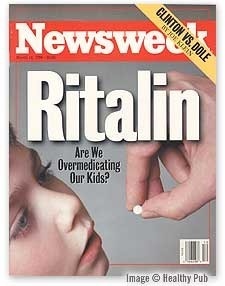 In the previous episode, David had a huge win at work: His white paper led to Congress's passing a single-payer health care bill, signed into law by President Hillary Clinton.
In the previous episode, David had a huge win at work: His white paper led to Congress's passing a single-payer health care bill, signed into law by President Hillary Clinton.Alas, David had little time to bask--there was a problem at home: His son Adam's teacher had referred him for special ed testing and the diagnosis came back: attention-deficit-hyperactivity disorder (ADHD.)
David and Susan had always known Adam was an active boy. They had observed him in class and saw that Adam had a hard time sitting still but David said, "I' don't remember having to sit for so long and do so much academic stuff in first grade. They hardly even have any recess." They considered Adam to be a normal active boy.
But when the school called David and Susan to attend a meeting with Adam's teacher, a special education teacher, the school psychologist, and the principal, they were sobered.
The school psychologist explained: "Perhaps in the old days, when 1st grade curriculum was more loosey-goosey, Adam's not paying attention, his distracting the other kids, could have been tolerated but now with the Common-Core Curriculum's ratcheted-up standards, we just can't let it go--not for his sake and not for the class's. We recommend he see a psychiatrist for therapy and at least a trial on Ritalin."
His teacher nodded. The special education teacher nodded. The principal nodded. David and Susan didn't nod. And David, as only David would, responded:
"You put active boys on a Ritalin leash because it makes life easy for you. Sure, you want every kid to be a compliant little worksheet doer but if you made the lessons more interesting than "Do problems 1-48 the odds" and allowed active boys to move around more, you wouldn't need to drug them. Put my son on an amphetamine to make your tenured life easier? No fucking way!"
David felt a bit of that pressure in his chest but took a couple of deep breaths and it went away. And David stormed out with Susan, embarrassed, following. She said, "Let's take the dog for a walk in the park. We can be calmer there."
At the park, David said, "Let's let Casanova off the leash."
"David, you know it's dogs on leash here. Don't."
"Screw it, "David said. "Silly rule."
They turned their attention to Adam's ADHD diagnosis and David said, "When I was a kid, I was just like Adam. If they had drugged me, I never would had the opportunity to learn how to cope with myself, how to adapt. I'd have to be on an amphetamine for the rest of my life, which would probably be shortened because that."
Susan and David agreed that the problem was not Adam but an overly constraining school with its passivity-insisting teachers. But they felt they couldn't send Adam to either of the other two local public schools: Most of the kids there were from deprived backgrounds so the curriculum had to be dumbed-down--Adam would learn far less than he could and should. And those schools simply were not safe. Susan said, "Knife fights, razor-blade fights...in an elementary school?!"
Their musings were rudely interrupted by a man's voice: "Stop right there!" It was a park policeman. "Your dog is not on a leash."
"Brilliant deduction," David sneered.
"I'm sorry officer." said Susan.
"Put that dog on the leash." And David did. "Now let me see your driver's license." And he wrote David a ticket.
David couldn't restrain himself: "I can't believe you're doing this. You couldn't make it as a regular cop so you're showing how powerful you are, Mr. Park Policeman?! What this going to cost me?"
"I don't know."
"Bullshit. You know."
"$300. "
$300!" David felt a bit of that chest pressure again, so he took deep breaths, and it went away.
After the cop left, David said, "Susan, we gotta move out of the Bay Area. This place is crazy: the schools, the traffic, the crime, the keep-up-with-the-Joneses, and shit like this--$300 for having your dog off the leash in an empty park?!"
"And lose your job? My piano teaching students? And make Adam change schools?"
The next episode is HERE.
Published on February 10, 2014 12:58
David's Saga: A continuing series on work today. Episode 11: Data Analyst as Hero
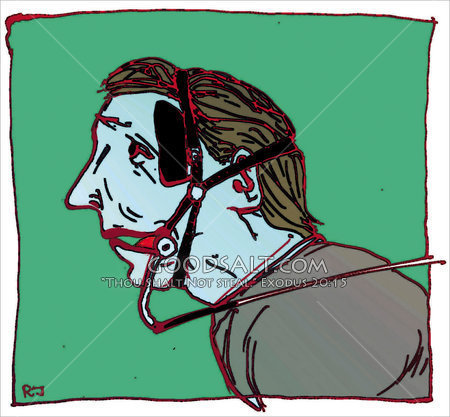 In the previous episode, while recovering from his second heart attack, David decided he wanted to abandon underwear marketing in favor of a non-profit career. And after volunteering at Physicians for a National Health Program, he was offered a job there--although at half what was earning as an underwear marketer. He just had to convince his wife.
In the previous episode, while recovering from his second heart attack, David decided he wanted to abandon underwear marketing in favor of a non-profit career. And after volunteering at Physicians for a National Health Program, he was offered a job there--although at half what was earning as an underwear marketer. He just had to convince his wife. And he was scared to try. After all, before heart attack 2, Susan had still been cracking the whip: "Just get another marketing job, David. Trying to change careers will mean a big pay cut. We can't afford that."
But much to his surprise, Susan needed no convincing. If for guilt alone, David's second heart attack made Susan realize that, lest she become one of the 6+ widows for every widower (and early,) she shouldn't force the husband she claims to love to do very-full-time work he hates and finds exhausting. She shouldn't push him back into the yoke, back to being a beast of burden.
So without a mote of observable resistance, Susan said, "Of course, David. I'll support whatever you choose to do."
David knew it was a mercy pass, like how someone might sleep with a person s/he feels sorry for. But that wasn't going to stop him, so he gratefully accepted both her get-out-of-jail-free card and the job as a data analyst for Physicians for a National Health Program.
Although he now worked longer hours than when he was an underwear marketer, using every IQ point to find nuggets supporting single-payer health amid the mountains of data, he hardly noticed the time and came home night after night no worse than pleasantly tired.
And just six months later, all his hard work paid off. He submitted a white paper to his boss showing, convincingly, that the nation's health--from rich people to poor ones--would be far better under a single-payer health plan. And with the insurance companies out of the picture, the cost would be lower. His boss was ecstatic, immediately gave David's white paper to the lobbyists, who in turn used it as the core of their presentations to key members of Congress. And just one year later---a blink-of-the-eye in government time--a single-payer health plan passed both houses of Congress and President Hillary Clinton eagerly signed it.
So David, an obscure data nerd, nearly single-handedly revolutionized health care in the United States of America.
His salary was doubled so he was now making what he had as an underwear marketer, but now he was doing work he considered vital. Next, David turned his data-analytic skills to figuring out the best ways to implement single-payer health care. All was right with his world, at least with his work world.
I hope to post the next episode by 11 AM today.
Published on February 10, 2014 00:30
February 9, 2014
David's Saga: a continuing series on work today. Episode 10: Sometimes It Takes a Scare
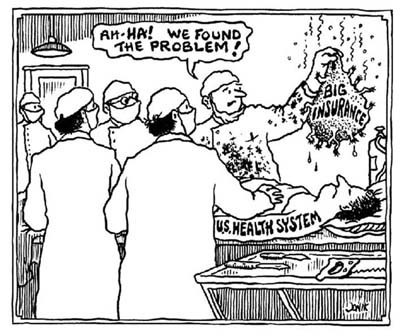 In the previous episode, under the pressure of a new, bad job he felt forced to take, David had his second heart attack.
In the previous episode, under the pressure of a new, bad job he felt forced to take, David had his second heart attack.Fortunately, it was another mild one and after a month at home, his doctor okayed him to return to work. But David knew that going back to that start-up, even if it had been a good one, was asking for trouble. Besides, cliched though it is, flirting with death made him rethink his priorities: Maybe he should, at least for starters, while he's still not 100 percent, do a little volunteer work.
But where? The obvious choice was health care reform. After all, his two coronary experiences with the health care system were battles. They weren't battles with the doctors and nurses who, while not perfect, were doing their best with the field of medicine still truly in just its adolescence, made especially difficult because of the Affordable Care Act forcing the system to try to care for tens of millions of newly insured people, most of whom pay little or nothing into the system. His battle was with the insurance companies. "They truly are monsters: doing everything in their power to avoid paying. Damn, if they're even questioning medical care for a heart attack, what the hell will they pay for?"
So David chose the obvious: to volunteer for Physicians for a National Health Care Program. And here, for the first time in his life, he felt at ease at work. "I don't care whether a widget sells or not. I care about people getting the health care they need without going broke, without a fight, without worrying whether a doctor is going to do an invasive test on me to cover his ass or, instead of prescribing a medication, doing a "procedure" (shorthand for painful and expensive surgery or invasive test) to make an extra grand for an hour's work."
At PNHP, David spent his day using his marketing mind to come up with smarter ways to lobby Congress to pass single-payer health care and his data-miner mind to find ammunition to support that lobbying. Work, this work, put fear of a third heart attack way to the back of his brain's bus.
After just a month of volunteering, someone he didn't know, in a suit, came into his cubicle and offered him a job: lobbying support analyst, basically doing what he'd been doing but now getting paid for it. The problem? The pay would be $65,000 a year, half of what he was making at UnderSports. He was down with that, super down with that, but what would Susan say?
The next episode is posted HERE.
Published on February 09, 2014 16:55
David's Saga: a continuing series on work today. Episode 10: Sometimes it takes a scare
 In the previous episode, under the pressure of a new, bad job he felt forced to take, David had his second heart attack.
In the previous episode, under the pressure of a new, bad job he felt forced to take, David had his second heart attack.Fortunately, it was another mild one and after a month at home, his doctor okayed him to return to work. But David knew that going back to that start-up, even if it had been a good one, was asking for trouble. Besides, cliched though it is, flirting with death made him rethink his priorities: Maybe he should, at least for starters, while he's still not 100 percent, do a little volunteer work.
But where? The obvious choice was health care reform. After all, his two coronary experiences with the health care system were battles. They weren't battles with the doctors and nurses who, while not perfect, were doing their best with the field of medicine still truly in just its adolescence, made especially difficult because of the Affordable Care Act forcing the system to try to care for tens of millions of newly insured people, most of whom pay little or nothing into the system. His battle was with the insurance companies. "They truly are monsters: doing everything in their power to avoid paying. Damn, if they're even questioning medical care for a heart attack, what the hell will they pay for?"
So David chose the obvious: to volunteer for Physicians for a National Health Care Program. And here, for the first time in his life, he felt at ease at work. "I don't care whether a widget sells or not. I care about people getting the health care they need without going broke, without a fight, without worrying whether a doctor is going to do an invasive test on me to cover his ass or, instead of prescribing a medication, doing a "procedure" (shorthand for painful and expensive surgery or invasive test) to make an extra grand for an hour's work."
At PNHP, David spent his day using his marketing mind to come up with smarter ways to lobby Congress to pass single-payer health care and his data-miner mind to find ammunition to support that lobbying. Work, this work, put fear of a third heart attack way to the back of his brain's bus.
After just a month of volunteering, someone he didn't know, in a suit, came into his cubicle and offered him a job: lobbying support analyst, basically doing what he'd been doing but now getting paid for it. The problem? The pay would be $65,000 a year, half of what he was making at UnderSports. He was down with that, super down with that, but what would Susan say?
The next episode is posted HERE.
Published on February 09, 2014 16:55
David's Saga: A continuing series on work today: Episode 9: Day One, Day Last at a Startup
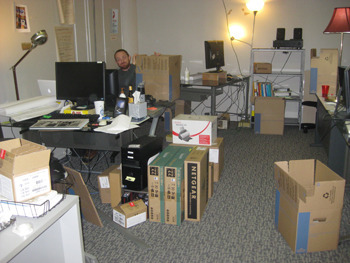 In the previous episode, David settled for a marketing "VP" job at UnderSports, a start-up that makes stain- and odor-resistant underwear.
In the previous episode, David settled for a marketing "VP" job at UnderSports, a start-up that makes stain- and odor-resistant underwear. They had interviewed him at Starbucks, which he thought was weird, probably a way to avoid showing the job candidates the less-than-plush office. But he didn't expect an office like this: computers still in the box, other stuff still in boxes, shelving still disassembled on the floor, and only one of the five employees there, staring into his computer.
"Welcome, David. Sorry about the mess. There's your desk. Like we said in the interview, start by creating a blueprint for our social media marketing presence. Are we good?"
"Yeah, we're good." That's what David said. What David thought was, "What in the world did I get myself into: No onboarding, no office support, and now it's all social-media marketing?! They didn't say that in the interview. SMM is so overhyped! And I'm probably marketing a bad product. Hey, I haven't even seen the product." Hey Gautham, have product samples?"
"Oh, the samples are with the sales guy. He's closing a lot of deals."
"You only have one set of samples?"
"Sorry. We should have product within a week."
"You're closing lots of deals without knowing there's product to deliver?"
"Welcome to the world, David."
David thought, "Welcome to your world. Even at Underarmour, they wouldn't pull that crap."
He trudged to his desk--yes, here he could get away with trudging without violating corporate culture. Here, there was no culture, corporate or otherwise.
He spent most of the day trying, really trying, to focus on developing the social media marketing plan for that product he's never seen, that no one has ever seen, let alone received a boatload of 5-star Amazon customer reviews. He decided to focus on the gross--After all, his market was teenagers willing to buy a lot of underwear. "Maybe a contest on Facebook in which people mailed in their smelliest, most stained underwear and then we have a live media event picking the worst. The theme 'This wouldn't happen if you were wearing UnderSports.'" And maybe a TwitterShitter campaign in which people proposed 140-character slogans for Undersports? Or a YouTube video with shit in a pair of UnderSports shorts--The tagline would be, "With UnderSports shorts, your shit doesn't stink."
But by 4:00, David had come to only one decision: He would quit at the end of the day. "But what would I do? I'd been trying to land a job for six months and this shit job--literally shit job--was the best I could get. If I quit, Susan will kill me. Damn, I can't stand the thought of going back into the job market. God, but I can't stand it here. Jesus!!!!"
And then that pressure in his chest that presaged his heart attack started again. And again, it shot up into his neck and down his left arm. "Gautham, would you call 911?"
The next episode is HERE.
Published on February 09, 2014 15:26
David's Saga: a continuing series on work today: Episode 8: The Job Hunt
 In the previous episode, even though David wished he could consider a career change, he felt forced to look for a job doing what he had always done: marketing. He and especially his wife felt he needed to go for what would most likely bring in a good paycheck fast.
In the previous episode, even though David wished he could consider a career change, he felt forced to look for a job doing what he had always done: marketing. He and especially his wife felt he needed to go for what would most likely bring in a good paycheck fast. Much as he disliked going back to marketing, he even more hated having to look for a job. So he was at least going to get it over with as fast as possible. He'd use the modern tools:
He created a LinkedIn profile. While he thinks social media marketing is overhyped, it's what employers want, so he titled himself, "marketing researcher with special expertise in social media." He had Susan take 100 mugshots of him until he found just the right one: that made him look upbeat without looking silly, smart without looking too nerdy. He thought, "So idiotic how much importance people place on looks. We can't be racist or sexist but we sure can be lookist. It's the last ism." He used CareerSonar to get notified of any on-target jobs offered by a LinkedIn connection or Facebook friend or their connections, or a job on one of the big employment sites: Monster, CareerBuilder, and the aggregators: Indeed and Simply Hired. One-stop shop, covering the most viable of 10+ million advertised jobs. Very cool. In addition to answering ads, he sent an email to his LinkedIn connections, Facebook Friends, and a half-dozen recruiters who specialized in marketing. He was careful to avoid sounding desperate or like a braggart and didn't mention his heart attack nor his month break of trying to figure out what the hell he really wanted to do. He realized that most people aren't keeping track of him and his chronology. Some might not even remember that he had a heart attack. His email just said, "After a great three years at UnderArmour--they actually considered me kind of a rock star--they had a group layoff. So now I'm looking for another great marketing job--market research is fine, social media marketing is okay. Main thing is that it's a good company. Anyone I should talk with?"
In interviews, when asked about his employment gap, he was crisp and ended with a question to deflect attention from the gap: "After 19 years of non-stop working, after Underarmour's group layoff, I decided to take a little break to get into my photography hobby and so on but am refreshed and glad to get back in the game. Tell me, if I turned out to be a rock star in this position, what would I have accomplished in the first couple months?"
Most of his inquiries yielded no response, the modern-day rejection. Yes, everyone's busy but it seems just a bit of human decency to send a brief "no" rather than leaving the person, who had put a lot of work into the inquiry, hanging.
Finding a job took David longer than he thought it would. "They really are looking mainly for 20-somethings willing to work 12-hour days for cheap. No wonder corporations want to expand H1-B Visas."
Six months later, his standards for a job dropped. He had to take a job at a startup. He had always avoided those: inexperienced management, no support system, worse pay and benefits, and too great a risk of the company soon not being able to make payroll.
And this startup felt particularly shaky. He signed on with a five-person company, all from Asia except him, with a CEO who talked too fast. He was now "vice president for marketing" (He was the only marketing person) at UnderSport, a startup creating underwear using stain- and odor-resistant fabrics.
The next episode is HERE.
Published on February 09, 2014 09:41
February 8, 2014
David's Saga: a continuing series on work today. Episode 7: For the sake of the marriage
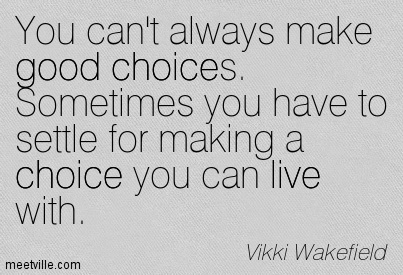 At the end of the previous episode, Susan agreed to let David take a month for "planned serendipity:" exploring what sort of work he might pursue and giving himself the first real break from work in his 19 years of working.
At the end of the previous episode, Susan agreed to let David take a month for "planned serendipity:" exploring what sort of work he might pursue and giving himself the first real break from work in his 19 years of working.But after a month of Sierra Club hikes, photography classes, dog-walking meetups, and a seven-day juice-fast meditation retreat, David was still clueless as to what to do careerwise.
"Susan, I need another month or two."
'David, our savings are starting to dwindle. It makes me nervous. If you haven't found your calling in all this time, another month won't likely help."
"I'm not looking for my calling. Only clerics and guests on Oprah have callings. I'm just looking for something that doesn't make me feel half-dead. I don't expect to find work that gives me a non-stop orgasm. Why don't you get some more piano students? You're only working 10 hours a week."
"There are a zillion piano teachers. I'm grateful I have 10 hours."
"But you do no marketing. I'll bet if you marketed just a little, you could get more students. Okay, what's your best way to market: schmooze demo classes in public schools, what?"
"I don't know."
"You love to show off your piano playing and you love to throw parties. Why don't you invite all your past and present students and their parents to the house and you play some duets with your students. That'll get you a few referral, I'll bet!"
"It feels like too much work for too little results."
"I think you just like your life just as it is---just enough work so you don't have to tell your friends you're a stay-at-home housewife."
"Fuck you!...Okay, I'll call the parents of my past students, say I was thinking of their kid and so I figured I'd pick up the phone and ask how they're doing. Without having to ask for business, that'll put me into their head and maybe they'll want me to start teaching their kid again or refer some other parent to me."
"Sounds great."
But then, David, you have to promise you'll go get a job now. Stop with the dreaming and find a marketing job. That's the only practical way for you, at age 42, with 19 years in marketing, to bring in enough money to afford the mortgage and pay for the damn private school. God, I wish there was a public school in our area we could send Damien to without feeling like we're throwing him to the wolves."
"Okay. I'll look for a marketing job."
The next episode is HERE.
Published on February 08, 2014 16:54
David's Saga: a continuing series about work today. Episode 7: For the sake of the marriage
 At the end of the previous episode, Susan agreed to let David take a month for "planned serendipity: " exploring what sort of work he might pursue and giving himself the first real break from work in his 19 years of working.
At the end of the previous episode, Susan agreed to let David take a month for "planned serendipity: " exploring what sort of work he might pursue and giving himself the first real break from work in his 19 years of working.But after a month of Sierra Club hikes, photography classes, dog-walking meetups, and a seven-day juice-fast meditation retreat, David was still clueless as to what to do careerwise.
"Susan, I need another month or two."
'David, our savings are starting to dwindle. It makes me nervous. If you haven't found your calling in all this time, another month won't likely help."
"I'm not looking for my calling. Only clerics and guests on Oprah have callings. I'm just looking for something that doesn't make me feel half-dead. I don't expect to find work that gives me a non-stop orgasm. Why don't you get some more piano students? You're only working 10 hours a week."
"There are a zillion piano teachers. I'm grateful I have 10 hours."
"But you do no marketing. I'll bet if you marketed just a little, you could get more students. Okay, what's your best way to market: schmooze demo classes in public schools, what?"
"I don't know."
"You love to show off your piano playing and you love to throw parties. Why don't you invite all your past and present students and their parents to the house and you play some duets with your students. That'll get you a few referral, I'll bet!"
"It feels like too much work for too little results."
"I think you just like your life just as it is---just enough work so you don't have to tell your friends you're a stay-at-home housewife."
"Fuck you!...Okay, I'll call the parents of my past students, say I was thinking of their kid and so I figured I'd pick up the phone and ask how they're doing. Without having to ask for business, that'll put me into their head and maybe they'll want me to start teaching their kid again or refer some other parent to me."
"Sounds great."
But then, David, you have to promise you'll go get a job now. Stop with the dreaming and find a marketing job. That's the only practical way for you, at age 42, with 19 years in marketing, to bring in enough money to afford the mortgage and pay for the damn private school. God, I wish there was a public school in our area we could send Damien to without feeling like we're throwing him to the wolves."
"Okay. I'll look for a marketing job."
I hope to have the next episode posted very late tonight or tomorrow.
Published on February 08, 2014 16:54
Marty Nemko's Blog
- Marty Nemko's profile
- 4 followers
Marty Nemko isn't a Goodreads Author
(yet),
but they
do have a blog,
so here are some recent posts imported from
their feed.



